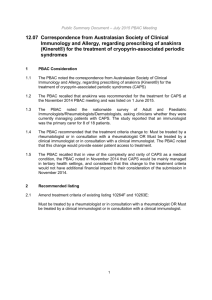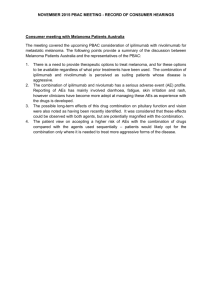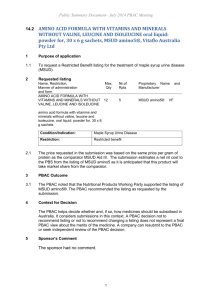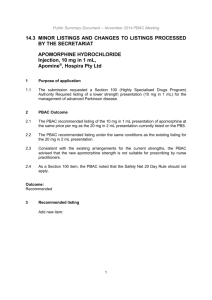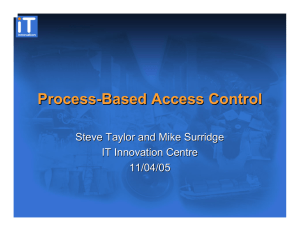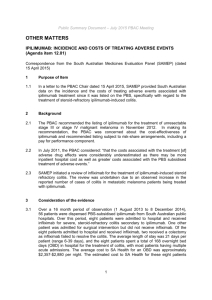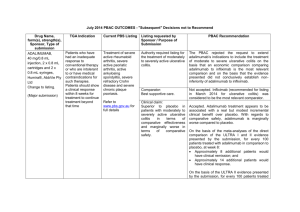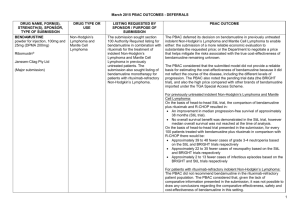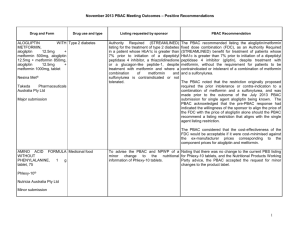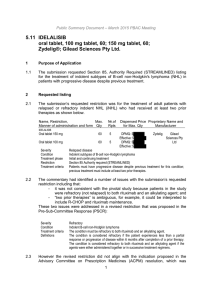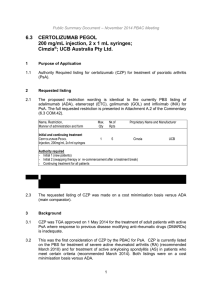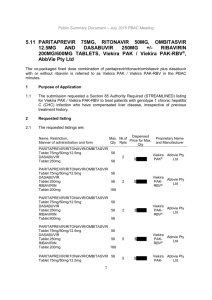1st Time Decisions Not to Recommend
advertisement
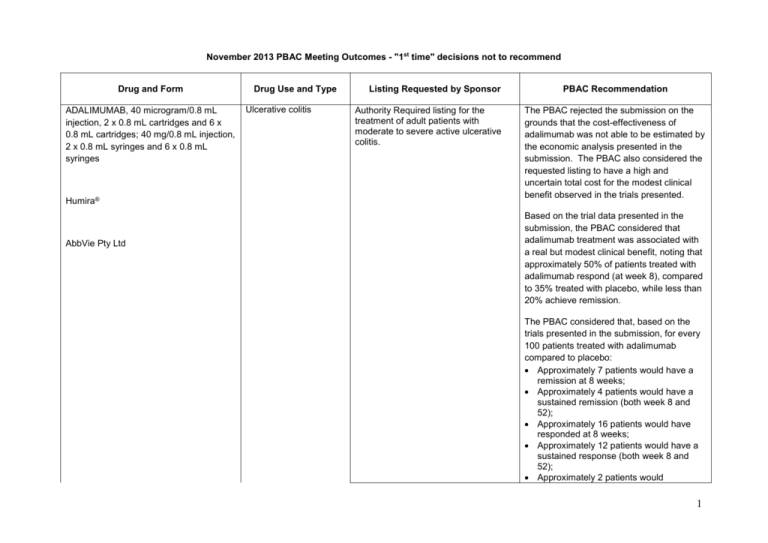
November 2013 PBAC Meeting Outcomes - "1st time" decisions not to recommend Drug and Form ADALIMUMAB, 40 microgram/0.8 mL injection, 2 x 0.8 mL cartridges and 6 x 0.8 mL cartridges; 40 mg/0.8 mL injection, 2 x 0.8 mL syringes and 6 x 0.8 mL syringes Humira® AbbVie Pty Ltd Drug Use and Type Ulcerative colitis Listing Requested by Sponsor Authority Required listing for the treatment of adult patients with moderate to severe active ulcerative colitis. PBAC Recommendation The PBAC rejected the submission on the grounds that the cost-effectiveness of adalimumab was not able to be estimated by the economic analysis presented in the submission. The PBAC also considered the requested listing to have a high and uncertain total cost for the modest clinical benefit observed in the trials presented. Based on the trial data presented in the submission, the PBAC considered that adalimumab treatment was associated with a real but modest clinical benefit, noting that approximately 50% of patients treated with adalimumab respond (at week 8), compared to 35% treated with placebo, while less than 20% achieve remission. The PBAC considered that, based on the trials presented in the submission, for every 100 patients treated with adalimumab compared to placebo: Approximately 7 patients would have a remission at 8 weeks; Approximately 4 patients would have a sustained remission (both week 8 and 52); Approximately 16 patients would have responded at 8 weeks; Approximately 12 patients would have a sustained response (both week 8 and 52); Approximately 2 patients would 1 experience iron deficiency anaemia; Approximately 3 patients would experience gastroenteritis; and Approximately 7 patients would experience nasopharyngitis. The PBAC considered that the economic modelling was not able to provide a reliable estimate of the cost-effectiveness of adalimumab. Sponsor’s comments: AXITINIB, 1 mg and 5 mg, tablet Inlyta® Pfizer Australia Pty Ltd Renal cell carcinoma (RCC) Authority Required listing for the treatment of Stage IV clear cell variant renal cell carcinoma (RCC) in a patient who meets certain criteria. AbbVie is committed to ensuring patients with moderate to severe ulcerative colitis access the benefits of Humira and will engage with PBAC to understand and address the issues raised. The PBAC rejected the submission to list axitinib on the PBS for the second-line treatment of Stage IV clear cell RCC on the basis of inadequate data to support the claim of superior clinical effectiveness over best supportive care (BSC). The PBAC considered that the indirect comparison presented in the submission was not informative for decision making purposes given the significant risk of bias in the RENCOMP study. Also there were substantial differences in the two studies used in the indirect comparison in terms of their design, the baseline characteristics of patients, the treatments and the methods of analyses. The PBAC agreed with the ESC that the submission did not adequately support the use of progression free survival (PFS) as a surrogate for overall survival (OS). Because the claim of clinical efficacy was 2 not substantiated by the data presented, the PBAC did not find the economic modelling to be valid or informative. Sponsor’s comments: Provision of overall survival evidence is an ongoing challenge in oncology necessitating alternative approaches to address reimbursement requirements in the context of the data deficiencies from clinical trials involving cancer patients. The Sponsor is considering its options. MULTICOMPONENT MENINGOCOCCAL GROUP B VACCINE, 0.5mL, injection, prefilled syringe Meningococcal B disease Inclusion on the National Immunisation Program (NIP) Schedule for prevention of Meningococcal B disease in infants and adolescents. The PBAC did not recommend the inclusion of the 4CMenB vaccine on the National Immunisation Program Schedule for the prevention of meningococcal B disease in infants and adolescents. Bexsero® Novartis Vaccines and Diagnostics Pty Ltd The PBAC considered that there was a limited demonstration of, and multiple uncertainties in relation to the clinical effectiveness of the vaccine against the disease when delivered in a vaccination program. In addition, the PBAC concluded that the ICER was unacceptably high and was based on uncertain assumptions about extent and duration of effect and herd immunity. The PBAC noted that the submission estimated that over 4 million children and adolescents would be vaccinated over the first 5 years of a full vaccination program. The PBAC noted that based on estimates provided by the Australian Technical Advisory Group on Immunisation (ATAGI), this vaccination program would prevent 224 cases of invasive meningococcal disease, 9 deaths due to meningococcal B disease, and 3 93 patients with sequelae after 5 years. The PBAC concluded that the rarity of invasive meningococcal B disease, compared to the large number of vaccinations that are required was the primary driver of the unfavourable ICER. Sponsor’s comments: Novartis Vaccines has initiated discussions with the PBAC to clarify and address the issues raised. 4
